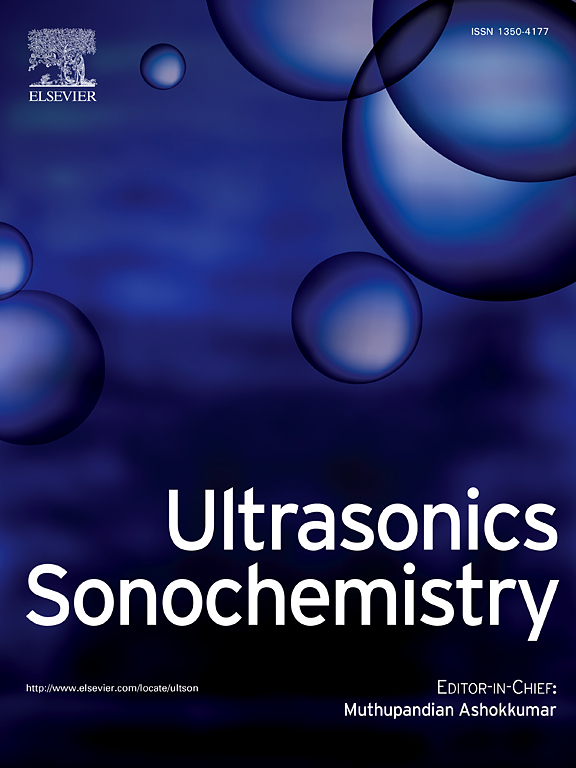双频超声下软组织中单个气泡的声空化特性数值研究
IF 8.7
1区 化学
Q1 ACOUSTICS
引用次数: 0
摘要
双频超声激励下的粘弹性组织会影响单个气泡的声空化。为了研究空化动力学的影响,Gilmore-Akulichev-Zener(GAZ)模型与彭-罗宾逊状态方程(PR EOS)相结合。结果表明,与 Gilmore PR EOS 和 GAZ-Van der Waals (VDW) EOS 模型相比,GAZ-PR EOS 模型能准确估计气泡动力学。此外,还研究了不同粘弹性组织中的声空化效应,包括气泡壁径向应力、温度、压力和气泡内水分子数量。结果表明,粘弹性引起的蠕变恢复和应力松弛会影响气泡的声空化,从而抑制气泡的膨胀,降低气泡内部的温度和压力。此外,还研究了双频超声对单个气泡空化的影响。结果表明,双频超声可提高气泡内部温度、气泡内部压力和气泡壁径向应力。更重要的是,通过探索不同的双频超声组合和组织粘弹性对单个气泡声空化的影响,发现了针对特定粘弹性的特定最佳频率组合。总之,本研究有助于为双频超声改善声化学效应和机械效应提供理论指导,并进一步优化其在声化学和超声治疗中的应用。本文章由计算机程序翻译,如有差异,请以英文原文为准。
Numerical investigation of acoustic cavitation characteristics of a single gas–vapor bubble in soft tissue under dual-frequency ultrasound
The viscoelastic tissue under dual-frequency ultrasound excitation affects the acoustic cavitation of a single gas–vapor bubble. To investigate the effect of the cavitation dynamics, the Gilmore-Akulichev-Zener (GAZ) model is coupled with the Peng-Robinson equation of state (PR EOS). Results indicate that the GAZ-PR EOS model can accurately estimate the bubble dynamics by comparing with the Gilmore PR EOS and GAZ-Van der Waals (VDW) EOS model. Furthermore, the acoustic cavitation effect in different viscoelastic tissues is investigated, including the radial stress at the bubble wall, the temperature, pressure, and the number of water molecules inside the bubble. Results show that the creep recovery and the relaxation of the stress caused by viscoelasticity can affect the acoustic cavitation of the bubble, which could inhibit the bubble’s expansion and reduce the internal temperature and pressure within the bubble. Moreover, the effect of dual-frequency ultrasound on the cavitation of single gas–vapor bubbles is studied. Results suggest that dual-frequency ultrasound could increase the internal temperature of bubbles, the internal pressure of bubbles, and the radial stress at the bubble wall. More importantly, there is a specific optimal combination of frequencies for particular viscoelasticity by exploring the impact of different dual-frequency ultrasound combinations and tissue viscoelasticity on the acoustic cavitation of a single gas–vapor bubble. In conclusion, this study helps to provide theoretical guidance for dual-frequency ultrasound to improve acoustic chemical and mechanical effects, and further optimize its application in acoustic sonochemistry and ultrasound therapy.
求助全文
通过发布文献求助,成功后即可免费获取论文全文。
去求助
来源期刊

Ultrasonics Sonochemistry
化学-化学综合
CiteScore
15.80
自引率
11.90%
发文量
361
审稿时长
59 days
期刊介绍:
Ultrasonics Sonochemistry stands as a premier international journal dedicated to the publication of high-quality research articles primarily focusing on chemical reactions and reactors induced by ultrasonic waves, known as sonochemistry. Beyond chemical reactions, the journal also welcomes contributions related to cavitation-induced events and processing, including sonoluminescence, and the transformation of materials on chemical, physical, and biological levels.
Since its inception in 1994, Ultrasonics Sonochemistry has consistently maintained a top ranking in the "Acoustics" category, reflecting its esteemed reputation in the field. The journal publishes exceptional papers covering various areas of ultrasonics and sonochemistry. Its contributions are highly regarded by both academia and industry stakeholders, demonstrating its relevance and impact in advancing research and innovation.
 求助内容:
求助内容: 应助结果提醒方式:
应助结果提醒方式:


